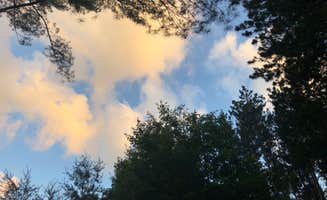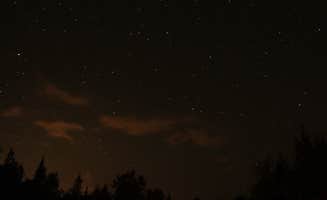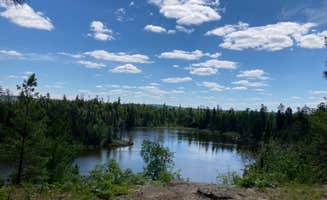Dispersed camping near Lutsen, Minnesota provides secluded wilderness experiences within the Superior National Forest. This region lies along the North Shore of Lake Superior with elevations ranging from 602 feet at the lakeshore to over 1,800 feet inland. Winter temperatures often drop below 0°F, while summer highs reach 70-80°F, creating distinct camping seasons with varying accessibility to remote sites.
What to do
Backcountry hiking access: Superior Forest Blackstone Lake Backpack Campsite requires approximately a half-mile hike from parking. As reviewer Janet R. notes, "Once you are set up, you have an amazing pristine lake to gaze at or swim in, or paddle on if you portage in a canoe or kayak! Then, you have a maze of hiking trails to hike from the campsite, over rugged rocky terrain."
Rock climbing exploration: The nearby Ennis Lake area features challenging cliff formations. According to Janet R., the cliffs at Ennis Lake are "sought after by rock climbers all over the region who are up for the challenging hike in before even tackling the cliffs." Plan for a full-day excursion if attempting this activity.
Winter camping preparation: State Land at Lax Lake Area offers year-round access with proper equipment. One visitor shares, "If you like wilderness, rustic, resourcing wood for fires and pure relaxation in the woods, here's the place for you to add to your trip. No where you'd find on the main searches, it's a place to respect."
What campers like
Secluded lake access: Lake Superior Overlook at Northshore Park provides dispersed options with lake views. Peter L. describes it as "Secluded with beautiful views" and notes "you can park in the RV lot and hike in with a low-key backpacking setup."
Stargazing opportunities: The minimal light pollution in dispersed camping areas creates exceptional night sky viewing. A camper at State Land reports, "Had a fun night by the fire talking with the couple and looking at the stars. Overall very cool spot."
Off-season solitude: Spring and fall offer fewer insects and crowds at many dispersed sites. A June visitor to Blackstone Lake noted, "We came in the third week of June, and experienced no ticks, no bugs, which was blissful!"
What you should know
Water planning essential: No potable water exists at dispersed sites near Lake Isabella. A camper at Lake Isabella Dispersed Open Field advises, "There is no potable water, so make sure to bring plenty. It's a long way back to a town to get more if you need it. We brought a 5 gallon jug with us and that worked for 2 days."
Seasonal pest considerations: Summer brings heavy mosquito activity at many sites. One camper at Blackstone Lake reported, "Got absolutely eaten alive by mosquitos the first night, tried to thug it out, and ended up leaving. I had long sleeves/pants and bug spray but it did not stop them."
Hunting season awareness: Fall brings hunters to many dispersed camping areas. A visitor to Lake Isabella suggests, "Lots of hunters this time of year (fall - October) so wear blaze orange is my recommendation. We heard shots fired for bird hunting, so just be aware it's allowed in this area."
Tips for camping with families
Fire ring considerations: Many dispersed sites have established fire rings but vary in size and usability. A camper at Lake Isabella Dispersed Open Field notes, "This site has a massive fire ring that has been built from rocks, but it's really far too big to be usable for a reasonable sized fire."
Seclusion factor assessment: Baker Lake Rustic Campground offers wide spacing between sites but may feel isolated for some families. One camper shares, "This place was pretty scary to camp at. Its just you at night and the darkness. You are in a pretty big site and campsites are spread out pretty far apart."
Wildlife education opportunity: Prepare children for animal encounters with proper food storage techniques. Many Superior National Forest dispersed areas require bear-safe food storage, and camping away from designated campgrounds increases wildlife interaction probability.
Tips from RVers
Access road evaluation: Check forest service road conditions before attempting remote sites with larger vehicles. A camper at State Land Lax Lake Area shares, "The dirt road in was fine, the driveway was overgrown and the clearing has lots of rocks and vegetation so glad I checked it out in the daytime."
Parking limitations: Lake Superior Overlook accommodates overnight vehicle camping but has space constraints. Lindsey F. advises, "Great spot for camping in your vehicle. Plenty of parking. No bathrooms or water."
Dispersed capacity planning: Some sites can accommodate multiple vehicles despite remote locations. At Lake Isabella Dispersed Open Field, "This site is fairly large and would easily accommodate any number of people. We were in a group of 4 with 3 dogs, and there was more than enough room."




